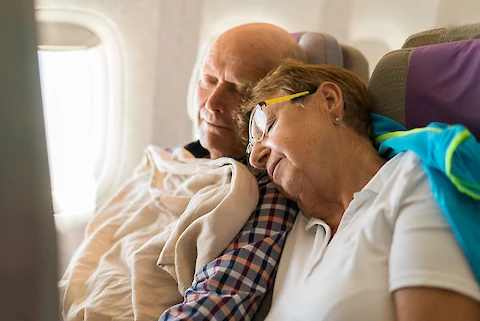
What to Expect If You're Flying With a Relative With Early Dementia
If you have an upcoming flight with a loved one who is living with early dementia, there are several things you can do to ensure the experience goes as smoothly as possible. While it's normal to feel nervous about navigating this situation, you should know that it is possible to have a comfortable and safe trip. At Senior Helpers Long Beach, we believe that living with dementia shouldn't stop a person from experiencing activities they enjoy, including travel. We will give you an overview of what to expect before, during, and after your flight and prepare you to handle any of the challenges you might face.
What to Expect Before and During Your Flight
Environmental changes can be confusing for individuals living with dementia, and long travel times can also be stressful. Be sure and explain your travel plans to your loved one many times. You should also arrive at the airport extra early to allow for lots of rest time, which can help minimize agitation.
Visit your airport's website before your trip, and review its accessibility information. If you're flying out of Long Beach Airport, for example, you can locate ADA-accessible parking and unloading zones and other airline-specific information here. Going through pre-flight security procedures can be made more comfortable by explaining to TSA officers about your loved one's dementia diagnosis. It's possible to be screened without being separated from your loved one.
During the flight itself, your loved one might be uncomfortable due to the airplane's noise level. It can be very helpful to bring noise-canceling headphones to help with this. You'll also want to pack your loved one's medications in your carry-on luggage, as well as their favorite snacks, and extra clothes.
The Most Common Challenges to Be Aware Of
Being in a crowded, busy environment can be overwhelming, so it's a good idea to locate quiet airport spaces ahead of time. You even might want to consider purchasing a pre-flight private lounge access pass. The most difficult aspect of flying is generally going through pre-boarding security procedures. However, informing TSA officers of your loved one's diagnosis will greatly help the process to be more comfortable and ensure you're not separated. It's also a good idea to identify your airport's companion care bathrooms in advance.
What You Can Do to Prepare
There are a number of steps you can take to make your traveling experience more comfortable:
- Avoid close flight connections and if possible do not schedule flights for times your loved one is usually tired or sleeping.
- Request a wheelchair or motorized cart to prevent exhaustion.
- Take minimal hand luggage so that you'll be freer to care for your relative.
- Consider getting an ID bracelet if your loved one is prone to wandering.
What You Can Do to Enjoy the Trip More Yourself
Be patient, keep your plans flexible, and try to manage your expectations for the trip. It's possible that despite your best efforts, your loved one won't have the experience you'd hoped for and that's okay. Instead, focus on the quality time you get to spend together. If you can, travel with another person who can help provide care.
Get Additional Support From Senior Helpers Long Beach
Senior Helpers understands the need of caring for a loved one with dementia, and we offer a lot of services that can help. From personal care to companion care, and more, we're always here to offer support for our local community. If you're in Avalon, Carson, Signal Hill, or Compton, our compassionate team can help your family continue living safely at home. Contact us to learn more.